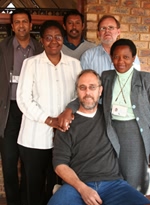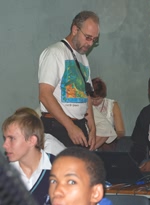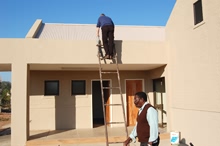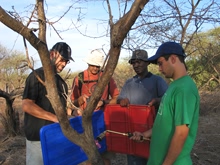Dave Balfour leaves a well-mapped blueprint for the future
|
Exactly a year ago, SAEON e-News published an interview with Dave Balfour, who had at the time just joined SAEON as manager of the SAEON Ndlovu Node, established at the Phalaborwa Gate of the Kruger National Park in 2005.
"He finds himself in a vastly challenging situation," the article read. "Not only is he required to establish and manage a brand-new observation node, but also the first of its kind within SAEON. His pioneering work will provide the blueprint for the establishment of other SAEON observation nodes throughout South Africa."
Prophetic words, and true. Dave's groundbreaking work at the node leaves an impressive legacy of well-established networks, education outreach initiatives, and a solid platform for observation and monitoring.
In a rented office without furniture, telephone or email connections, he literally had to start the Node from scratch. "This turned out to be one of my key challenges," Dave says with a chuckle, "and I did a lot of my work from an internet café in those early days."
Another challenge was to get acquainted with the finance and administration systems of the Kruger National Park as host organisation of the Node, and correlate them with those of SAEON's national office.
Despite some setbacks on the science-side of the establishment process, Dave managed to form partnerships with key environment-minded organisations in the region such as the Agricultural Research Council (ARC) and Wits Rural Facility. Together they were instrumental in determining core sites for observation and monitoring of the savanna biome.
Dave also worked closely with Kruger Park to organise networking meetings and establish the Lowveld GIS Forum to explore synergies between key environment-minded organisations in the region and encourage them to start working together on initiatives such as data sharing.
But among the people of Phalaborwa, Dave will always be fondly remembered for the outstanding and groundbreaking environmental science education programmes that were advanced under his leadership, and in which he took a keen personal interest. He personally campaigned to raise funds for education projects, and frequently engaged the learners in hands-on training and mentoring. The National Science Week programme in the area met with great success and elicited extensive positive media coverage for the Node in print and broadcast media, locally and nationally. Dave sees the programme's next challenge as going beyond learners and teachers to involve school principals and circuit managers.
In this area, too, baseline partnerships have been formed - including those with the Palabora Foundation, Hoedspruit Endangered Species Centre and the SA Wildlife College - to create a win-win situation for all parties involved, but primarily for the young people of the region.
|
Dr Balfour has nothing but praise for SAEON. "The Network is on the move," he says, "it is currently riding an upward wave, set in motion by a small yet dynamic and competent team."
Dave lists the milestones in the establishment of the SAEON Ndlovu Node primarily as:
- good and mutually conducive relations with the Kruger National Park
- a logic for core site selection for observation and monitoring
- a world-class environmental science outreach programme for the BaPhalaborwa region with innovative new projects such as Teachers Tearoom Forums to train and inform teachers who would like to learn more about environmental science
- infrastructure for the Node, which includes a new office building, furniture and communication networks.
Dave's ties with SAEON will not be severed. In his new position he will facilitate, enable and promote research in biodiversity and natural resources. One of his primary responsibilities will be to establish partnerships with environmental bodies, and he aims to actively promote the free interchange of research and observation data between SAEON and the Eastern Cape Parks Board. "I will ensure that our data is consolidated into meaningful datasets which are compatible with those of SAEON," says Dave, "so that the Eastern Cape Parks Board can be an active partner and contributor to the national initiative which is SAEON."
Dave leaves behind Joe Sibiya (Ndlovu's Environmental Science Outreach Officer) as acting Node Manager until a new manager is appointed. Interviews for his post were held at the end of July. Nicola Stevens will join SAEON Ndlovu Node in September 2006 as the new Information Manager.
With the appointment of a new Node manager, the Node will be close to fully operational, due largely to Dave's pioneering work, and the significant value that he has added to the establishment of the node, node networks, and the people of BaPhalaborwa.














